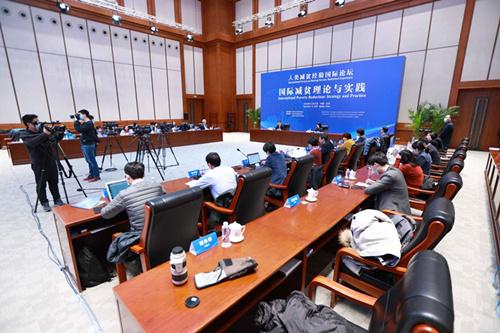China’s experience contributes to global poverty reduction
Author:WANG CHUNYAN Source: Chinese Social Sciences Today 2020-12-24
Under the framework of the International Forum on Sharing Poverty Reduction Experience, CASS hosts a symposium on the theory and practice of international poverty reduction. Photo: Yang Chonghai/CSST
Experts shed light on global poverty reduction and China’s relative experience at the International Forum on Sharing Poverty Reduction Experience in mid-December. The forum also released a consensus statement.
Poverty is a severe challenge facing the world today, and “poverty eradication and common development” is the shared vision of all people in the world, said Xie Fuzhan, president of the Chinese Academy of Social Sciences (CASS). With the concerted efforts of all parties, considerable progress has been made in global poverty reduction, but poverty governance still has a long way to go.
The poverty reduction in China, the most populous developing country in the world, is an important part of global poverty reduction, Xie continued. At present, China has completed its mission of poverty alleviation in the new era and has made important contributions to the cause of global poverty reduction. In addition, China has also actively carried out international cooperation in poverty reduction through various channels and methods, such as promoting South-South cooperation and jointly building the Belt and Road, contributing Chinese wisdom and strength to the cause of global poverty reduction.
China’s poverty reduction achievements and experience provide a Chinese model and Chinese approach that can be used for reference in global poverty reduction and the development of human society, Xie noted. In order to share poverty reduction experience and promote poverty reduction cooperation, CASS took the lead in writing a special report on China’s poverty reduction achievements, experience, and international cooperation, including the general report and 12 sub-reports. It is hoped that through the Chinese and English versions of this special report, China will fully share its poverty reduction practices and experience with the international community, contributing wisdom and strength to the promotion of global poverty reduction and sustainable development, and helping to build a community of shared future for mankind.
On Dec. 15, under the framework of the forum, CASS hosted a symposium on the theory and practice of international poverty reduction.
Over the past more than 40 years since the reform and opening up, China has eliminated absolute poverty under current standards, gaining experience in large-scale poverty reduction and the rapid elimination of absolute poverty, said CASS Vice President Gao Xiang. China’s great achievements in poverty reduction are inseparable from the support and assistance of other countries and international organizations. In this spirit of generosity, China has also provided assistance to other developing countries without any political conditions, supporting and helping a vast number of developing countries, especially the least developed countries, to eliminate poverty.
Eliminating poverty is the common mission of mankind. Promoting the establishment of a new type of international relations centered on mutually beneficial cooperation is an important guarantee for human society to eliminate poverty and achieve sustainable development, Gao concluded.
Paul Ladd, director of the United Nations Research Institute for Social Development, said that poverty is a very complex issue. It is necessary to understand the manifestations of poverty in multiple dimensions, analyze the causes of poverty, and focus on poverty-related health care, education, and public facilities. Feasible policies and measures should be formulated on this basis.
Inequality should be a constant concern, Ladd said. Inequality often occurs among the impoverished. Inequality means that the fruits of development are not shared fairly by all. A high degree of inequality will hinder poverty reduction’s progress and fuel serious crimes.
For developing countries including India, China’s poverty alleviation experience is worth learning from, according to Sudheendra Kulkarni, former chairman of the Mumbai-based think-tank Observer Research Foundation. Under the leadership of the CPC, the Chinese people stand in solidarity, fully mobilizing resources and working together towards the same goal. In addition, China has made full use of contemporary science and technology, especially digital technology, to promote economic growth.
Judging from China’s poverty reduction practices, poverty reduction is not just a problem of poverty alleviation. Rather, it requires more extensive economic and social reforms to achieve rapid and inclusive economic growth, and it also requires a fair distribution of wealth, said Arkebe Oqubay Metiku, special adviser to the Prime Minister of Ethiopia. International cooperation plays a vital role in the process of poverty reduction. It is necessary to promote cooperation between developed and developing countries, as well as among developing countries, within the framework and background of multilateralism. The platform established by the Forum on China-Africa Cooperation has played an important role in poverty reduction.
Having measured the gap between countries and the Sustainable Development Goals, the OECD understood that although extreme poverty is rare in OECD countries, relative poverty is still a serious challenge, said Tamas Hajba, OECD representative to China and senior advisor on China. 14% of the population in OECD countries are still below the poverty line, taken as half the median household income of the total population, and the poverty rate has been rising for the past three decades. In this context, to continuously eradicate poverty, it is crucial to promote sustainable and inclusive economic growth. Looking to the future, we must focus on solving social inequality, and measure and address poverty in multiple dimensions, while promoting international cooperation in poverty reduction.

